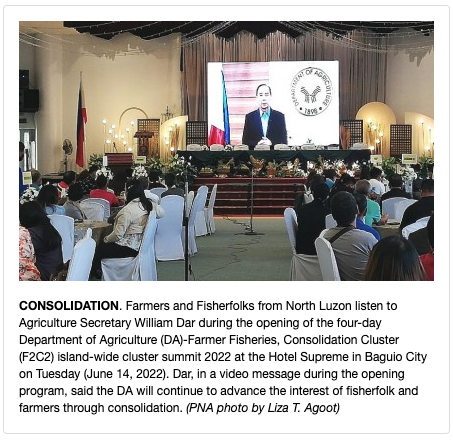
BAGUIO CITY – Department of Agriculture (DA) Secretary William Dar on Tuesday said the government will continue to support and give a voice to the agricultural sector by “consolidating” its produce and “clustering” farmers and fishers groups.
In a video message during the opening of the DA-Farmer Fisheries, Consolidation Cluster’s (F2C2) Island-wide Cluster Summit 2022 at the Hotel Supreme in Baguio City on Tuesday, Dar said the DA continues to come up with a program advancing the interest of fisherfolk and farmers through consolidation as one of the core pillars of the ONE-DA agenda.
Consolidation, the number one pillar in the ONE-DA reform agenda, is a strategy that puts together all the banner programs of the agency and implements through clusters.
The other top pillars are modernization, industrialization, and professionalism.
He said the goal is to help the farmers improve their livelihood by achieving economies of scale and improving the bargaining power of small farmers and fisherfolk by forming them into clusters and consolidating their produce, by giving the support they need.
Consolidation of farmers and fisherfolk will give the needed advantage that they have sought,” Dar said.
The Secretary said consolidating their produce would allow farmers to produce the requirement of the country.
Shandy Hubilla, director for the F2C2 program, said north Luzon currently has 3,858 groups composed of 484,000 farmers and fisherfolk.
“Kayo po ang napaka-importante na pillar dahil sa inyo nangyayari ang ONE-DA reform agenda,” he told the more than 300 participants coming from Regions 1, 2, 3, and the Cordillera Administrative Region (CAR) who are members of agriculture associations, cooperatives, and organizations.
He said the concept of F2C2 is to put together farmers and fisherfolk in contiguous areas with the same products to create one big enterprise that will be empowered, has the bargaining power, and food produced will be assured that they will not be wasted as each item will have a market to go to.
Cordillera has 12 clusters; Region 1 has 46; Region 2 has 39; and Region 3 has 77.
Most of the clusters are in rice production, 241 clusters; corn production, 200; high-value crops production, 136; livestock production, 55 cluster, and others.
Hubilla said at least 75 percent of the clusters and their members are registered with the Registry System for Basic Agriculture (RSBA).
“It is more expensive to transact individually than when talking to a group,” he added.
Collaboration, he said, would result in a more viable income or profitability of the activity that is integrated or included in a value chain of food production based in the community and involves people in collaborative governance.
He said the DA has partnered with big buyers that buy from the consolidated clusters because of the assurance of the continued supply of the commodity.
Senator Cynthia Villar, chairman of the Senate’s committee on agriculture, in a video message also said that the F2C2 strategy will address the low level of production in certain areas of the country or of specific commodities.
DA-CAR Director Cameron Odsey, in an interview on the sidelines of the event, said the stories about vegetable produce being disposed of and left rotting will not happen if they are consolidated.
The F2C2 North Luzon summit is the first after its creation in August 2020 under an administrative order issued by Dar.
The next summit will have the South Luzon clusters as participants. (PNA)













